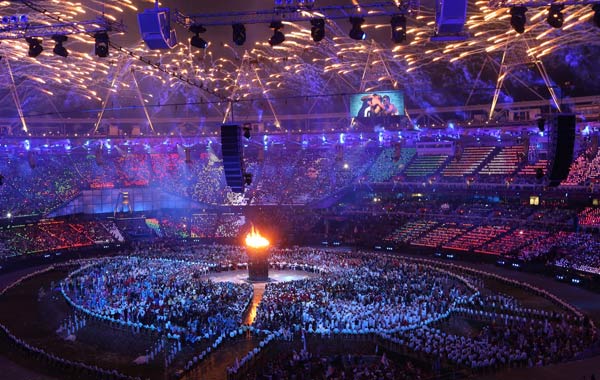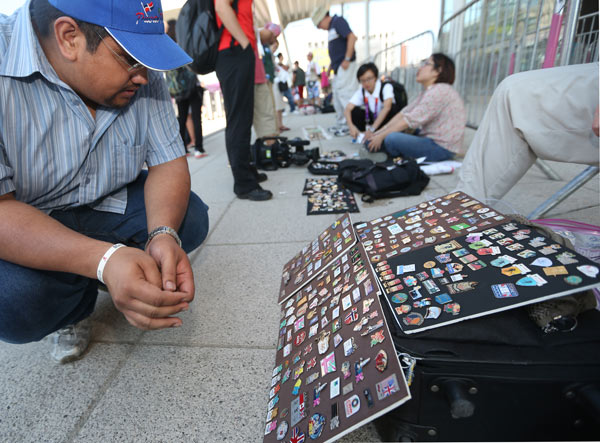Olympics provide opportunity for commercial success, reports Diao Ying from London.
|
 |
|
A scene from the opening ceremony of the 2012 Olympic Games. The lights on the seats were made by the Chinese company, Crystal CG International. Photos by Cui Meng / China Daily |
The most expensive ticket for the opening ceremony of the London Olympics cost $3,140 and a ticket for one of the track finals could cost as much as $1,130. With a special pass slung across his neck, hanging from a purple lanyard, George Hamilton, a Chicago businessman, has access to all the events.
However, he has no time to watch sport. As the head of Olympic marketing for Dow Chemical, a worldwide partner of the London Olympics, Hamilton is far too busy. "I've got accreditation to all the venues but, as a top sponsor, I have no time to see any of the events," he said.
Dow Chemical declined to disclose how much it paid to sponsor the Olympics, but Hamilton said that the company is aiming to garner business worth $1 billion over the next 10 years. He and his colleagues are busy selling their wares during the Games.
Those lucky enough to attend London 2012 - from officials from more than 100 countries, to construction companies, designers and engineers - are all potential clients for Hamilton and Dow Chemical.
The modern Olympics are as much about money as celebrating sporting prowess. "Olympic" is the world's second most-valuable brand, next only to the computer and phone manufacturer Apple Inc, according to the consultancy Brand Financial in London, which estimates that the Olympic brand is worth $47.6 billion. That's 134 times more than the value of the National Bank of Greece, the country in which the Games originated.
TOP sponsors
The most expensive way to be associated with the Olympic brand is to become what's known as a TOP sponsor, meaning that a company is allowed to use the famous "Five Rings" logo as part of its global marketing and promotional activities. None of the companies was willing to reveal the financial details involved in their sponsorship deals, but there were 11 TOP sponsors for the period 2009 to 2012, providing the International Olympic Committee with revenue of $957 million. That works out at an average of $87 million per sponsor, but some of the companies will have paid more than others.
 |
|
Pin collectors trade their favorites outside the Olympic Village in London, including the official 2012 mascots Wenlock and Mandeville, Produced by Chinese manufacturers. |
The Olympics is marketed as an event for everybody, but sometimes the sponsorship deals can lead to friction. Sebastian Coe, the head of the London Organising Committee of the Olympic and Paralympic Games, admitted on Today (BBC Radio's flagship news program) that a Nike T-shirt would not be popular at the event, because the rival sportswear manufacturer Adidas is one of the major sponsors, or "partners" as the corporate jargon has it, of London 2012.
And in the unlikely event that you arrive at the Games without cash, you'd better make sure you have a Visa card, another sponsor, close at hand, because no other cards are accepted onsite.
Not even the famous British staple meal of fish and chips has been left untouched by the regulations. Visitors to the event can buy fish and chips, of course, but independent vendors are not allowed to sell the two items separately, because the US burger chain, McDonalds, is the only accredited supplier of fries at the event.
"The Olympics is one of the most successful businesses in the world," said Roger Yin, chief executive officer of Honav UK Ltd - a subsidiary of the Chinese company Beijing Huajiang Culture Development Co, known informally as Honav - which holds the rights to make pins featuring the official 2012 mascots, Wenlock and Mandeville, for the Games. Despite the expense, 90 percent of the top sponsors renew their contracts year after year, with Coca-Cola Co, for example, boasting the longest continuous partnership with the Olympics, a link that goes back to its sponsorship of the 1928 Games in Amsterdam.
Olympic sponsorship has been a turning point for many companies in terms of brand value. For example, the consumer electronics giant Samsung Electronics Co was hardly known outside South Korea, its home country, until it became a TOP sponsor in 1997. "It was a difficult decision to invest a huge amount of money, since it was during the Asian financial crisis," said Sunny Hwang, head of sports marketing at Samsung.
However, the company was desperate to be associated with the Olympics and other top companies. The move "was very successful" and Samsung's brand value is now $25 billion, five times as much as in 2000, according to Hwang. "Sports marketing played a significant part in that," he said.
Sponsorship also boosted sales. The market share of Samsung's cell phones in China doubled after the 2008 Beijing Olympics, thanks to a successful marketing campaign during the event, according to Hwang.
